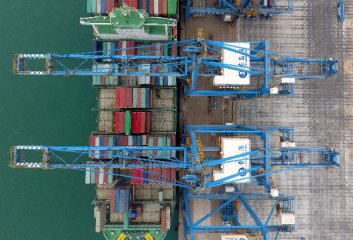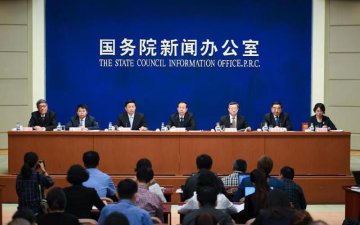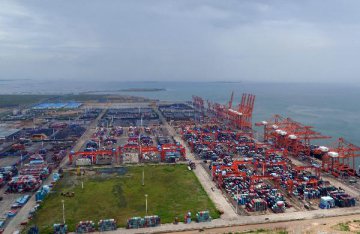
U.S. officials are debating ratcheting back tariffs on Chinese imports as a way to calm markets and give Beijing an incentive to make deeper concessions in a trade battle that has rattled global economies.
The idea of lifting some or all tariffs was proposed by Treasury Secretary Steven Mnuchin in a series of strategy meetings, according to people close to internal deliberations. They say the aim is to advance trade talks and win China’s support for longer-term reforms.
But Mr. Mnuchin faces resistance from U.S. Trade Representative Robert Lighthizer, who is concerned that any concession could be seen as a sign of weakness, these people said.
In past China discussions, Mr. Trump has sided with Mr. Lighthizer on tariffs, rather than Mr. Mnuchin. But this time, the president has made clear he wants a deal—and is pressing Mr. Lighthizer to deliver one, according to people familiar with the discussions.
The U.S. and China are seeking to resolve their dispute ahead of a March 1 deadline. At 12:01 a.m. the following day, tariffs on $200 billion of Chinese goods are scheduled to jump to 25% from the current 10%. The higher levies could batter U.S. importers and further harm an already weakening Chinese economy.
While Mr. Lighthizer is leading the trade talks, Mr. Mnuchin has been active in formulating the administration’s strategy. In talks with members of the trade team, Mr. Mnuchin raised the possibility of offering to eliminate tariffs during discussions scheduled for Jan. 30 in Washington with top Chinese trade envoy Liu He—a month ahead of the target date to conclude the negotiations.
“It could be an arrow in the quiver” of U.S. negotiators, said one of the people tracking the talks.
Mr. Lighthizer has taken his oft-stated hard-line in trade talks, contending that China hasn’t lived up to past agreements and can’t be trusted to do so in the future. In the discussions with China, he has said the U.S. should remove tariffs only when China has shown it has carried out promises made during the talks.
But Mr. Lighthizer has shown some signs of easing his position, say people involved in the talks, including raising the possibility that some tariffs could be reduced if the U.S. strikes a favorable deal on March 1.
A Treasury spokesman said bargaining positions “are all at the discussion stage” and that “neither Secretary Mnuchin nor Ambassador Lighthizer have made any recommendations to anyone with respect to tariffs or other parts of the negotiation with China.” Talks are “nowhere near completion,” the spokesman said.
A spokesman for the U.S. Trade representative said he concurred with this statement.
In recent days, Mr. Trump has made bullish remarks on the prospects of striking an agreement. “I think we’re going to be able to do a deal with China,” he told reporters Monday.
In Beijing, many officials are also cautiously optimistic about the prospects of a deal. In the past week, China’s commerce officials have publicly touted progress both sides made toward reaching an agreement.
Next week, Beijing is planning to dispatch to Washington two midlevel officials long involved in the talks, Commerce Vice Minister Wang Shouwen and Finance Vice Minister Liao Min to prepare for the talks between Mr. Liu and Messrs. Lighthizer and Mnuchin.
Even high-level strategizing about eliminating tariffs represents a striking turnaround for an administration that hasn’t lifted steel and aluminum tariffs on its closest allies and is still threatening them with a 25% levy on car imports. In early December, Mr. Trump declared himself a “tariff man.”
The president finds himself torn. On the one hand, he has been spooked by the decline in U.S. markets last fall and continuing volatility, say White House officials. Investors are closely watching the outcome of the talks.
On the other hand, say Trump aides, the president doesn’t want to be seen as weak on China and has relied in the past on tariffs to show that he will press Beijing to the hilt.
Mr. Mnuchin has talked of eliminating the tariffs on $200 billion of Chinese goods, and raised the possibility of lifting tariffs on an additional $50 billion of Chinese goods that have been in effect since August.
“He is engaged with colleagues in discussing a number of strategies,” said a person familiar with the talks.
Presidential adviser Jared Kushner has indicated some sympathy for lifting at least some tariffs, say those tracking the talks, but not on the scale of Mr. Mnuchin.
Over the two years of the administration, however, Mr. Kushner has told people he has become more “realistic”—that is to say hawkish—about China and recommends they read Michael Pillsbury’s “The Hundred Year Marathon,” which argues that Beijing has a covert plan to replace the U.S. as the world’s superpower.
He also has become closer to Mr. Lighthizer, with whom he worked on renegotiating the North American Free Trade Agreement. Recently, Mr. Kushner and his wife Ivanka Trump, the president’s daughter, socialized with the trade representative in Florida, U.S. officials say.
A spokesman for Mr. Kushner says he isn’t pressing to lift tariffs. Trade adviser Peter Navarro and members of the Trump national security team generally line up with Mr. Lighthizer.
“The administration is in early preparatory phases of taking stock of China’s approach. The range of options include a reward for China’s progress,” said Mr. Pillsbury, a Hudson Institute China scholar, who consults regularly with the White House. But to get China to make further concessions, “there is also a case to increase the pressure on China,” Mr. Pillsbury said.
Resolving the trade fight is a priority for both Beijing and Washington. China’s economy is weakening faster than expected as the country’s vast manufacturing sector feels the pain from U.S. tariffs. Retaliatory tariffs from Beijing also have punished many U.S. businesses, especially farmers, who are among Mr. Trump’s key supporters.
Other countries are starting to feel the effects too. One of Apple Inc.’s big Japanese component suppliers, Nidec Corp., cut its earnings forecast and blamed the U.S.-China trade conflict for a sharp slowdown in demand from China.
The coming talks are expected to address core Washington complaints, including China’s subsidies to domestic firms and government pressure on American companies to transfer technology to their Chinese partners.
The new round of negotiations follows three days of discussions between midlevel trade officials in Beijing last week. During those meetings, Chinese officials offered to purchase more U.S. goods, especially related to agriculture and energy, but didn’t make any firm commitments.
Source: The Wall Street Journal






















Latest comments